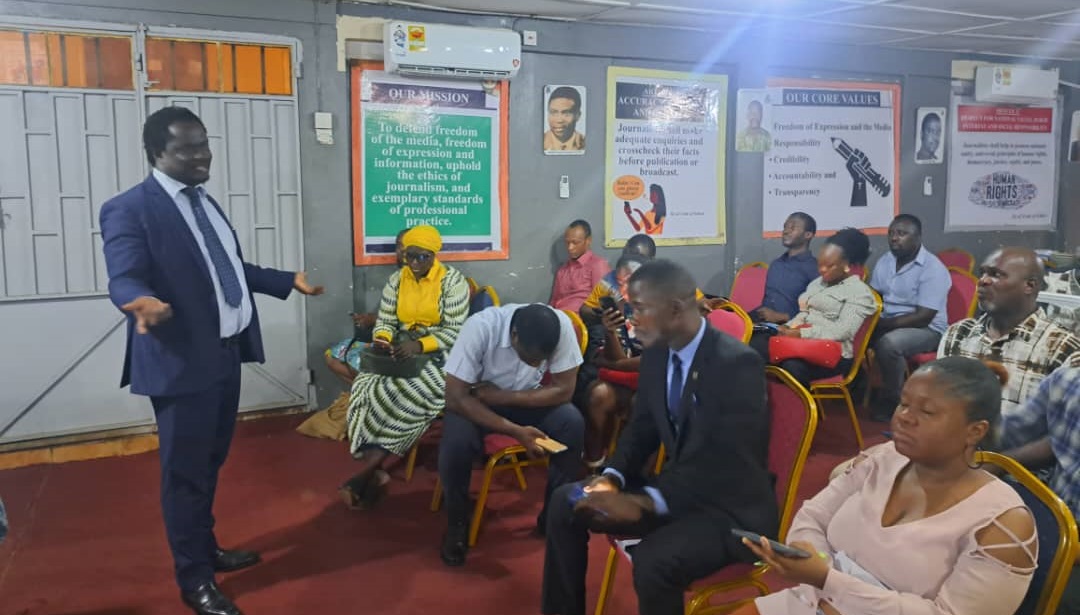With funding from the International Federation of Journalists (IFJ), the Sierra Leone Association of Journalists (SLAJ) on 1st August 2024 concluded a workshop on Cyber Law Reform in Sierra Leone.
The training workshop was held on 31st July and 1st August 2024 at SLAJ Headquarters in Freetown.
The aim was to discuss, critique, and develop advocacy campaigns regarding Sierra Leone’s Cyber Security and Crime Act 2021 sections that impinge on free media, free expression, and people’s data rights.
The workshop brought together 20 participants composed of journalists, bloggers, civil society activists, and legal practitioners as part of IFJ’s support in demanding press freedom and free speech in the small West African country.
Declaring the workshop open, the President of SLAJ, Ahmed Sahid Nasralla said the review workshop seeks to respond to the specific media demands on certain sections of the law ensuring that the law does not stifle press freedom and free speech. He noted that the workshop also seeks to enhance professionalism among journalists and promote press freedom, free speech, and media freedom.
The SLAJ President gave an overview of SLAJ’s involvement in enacting the cyber law, citing the media’s position paper on the cyber bill and some of the concerns raised therein. He said some of those concerns were addressed by Parliament but some sections in the Act, like the provisions in Section 44, still challenge free speech and free media.
“We are not saying the Cyber Security and Crime Act is bad legislation. We are saying that this law has some sections that have the potential to undermine freedom of expression and of the press. It took us 55 years to convince the authorities to repeal the infamous Criminal and Seditious Libel Law; we should not wait that long to get them to review these problematic sections in the cyber law. That is why we need this coalition of journalists, bloggers, civil society activists, entertainers, and legal practitioners to increase their knowledge of the cyber law and then develop an advocacy campaign to engage the authorities,” said Nasralla.
The lead facilitator, Francis Sowa Esq, highlighted the workshop’s interactive approach, which included discussions to enhance participants’ understanding of the Act, identify problematic sections, and strategize engagement with government agencies for a review.
He emphasized the need to interpret and define unclear terms in the Act, especially those related to offenses that are inadequately explained.
Dr. Sowa stressed the danger of having undefined terms and offenses in the Act suggesting that there is a need to revisit the Act to clearly define these terms under the Interpretation section.
Journalist Lawrence Williams, noted that offenses like ‘cyberbullying’ are not clearly defined and must be explicitly clarified to distinguish between ‘cyberstalking’ and ‘cyberbullying’.
Steven Kotoquee, a private legal practitioner, called for clarity on the definition of a child as stated in Section 57 while journalist Mohamed Sankoh suggested the establishment of an independent body equivalent to an agency, noting that the current advisory council provided in the Act, composed mainly of government officials, requires reform to ensure broader representation. He further urged a review of the council’s functions and powers while emphasizing the need to ensure that procedures under Part 4 of the Act are human rights-friendly.
Another journalist, Christian Conteh, argued for protections that allow the pursuit of factual information in the public interest as part of journalistic duties. He emphasized that certain offenses of the law, akin to the Budapest Convention, should remain civil.
The two-day workshop concluded with development of an advocacy strategy for engagement with relevant authorities including the Parliament of Sierra Leone.











